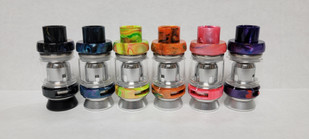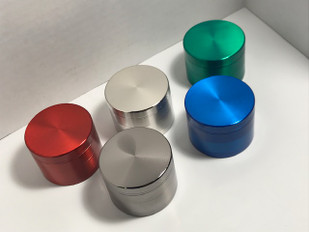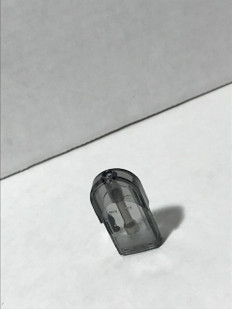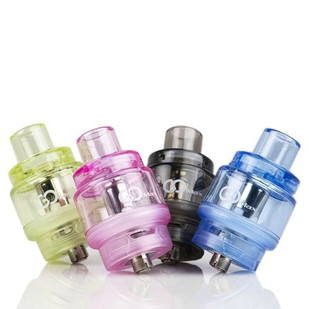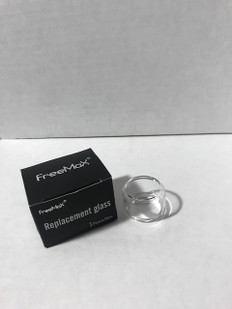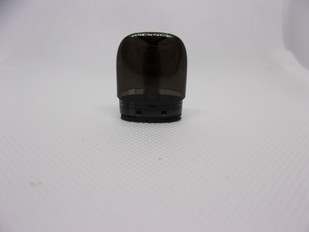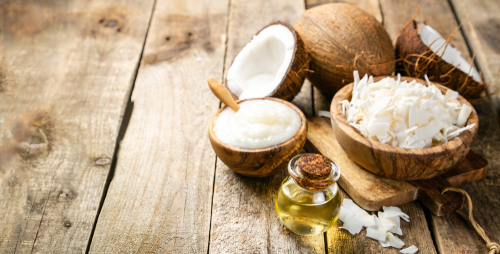- Home
- The Vape Mall Blog
- Everything You Need to Know About MCT Oil in 2024
Everything You Need to Know About MCT Oil in 2024
Posted by on
The main feature of MCTs is that they're metabolized differently than the longer-chain fats typically found in foods. MCTs are absorbed directly from the gut into the liver and can be used as an immediate source of energy or turned into ketones. Ketones are substances produced when the liver breaks down a lot of fat, and they can be used by the brain for energy instead of glucose or sugar.
What are the Benefits and Side Effects of MCT Oil?
Before diving into these, we need to point out that it's important to start with a low dose of MCT oil and gradually increase it to assess tolerance. Also, individuals with certain health conditions or those taking particular medications should consult with their doctor/physician before adding MCT oil to their regimen.
MCT Oil Benefits
MCT oil is touted for various health benefits, including:
- Weight Loss and Management: Some studies suggest that MCT oil can help increase the release of two hormones that promote the feeling of fullness in the body: peptide YY and leptin.
- Instant Source of Energy: Since MCTs go directly to the liver and can be used for energy immediately, they can provide a quick source of energy.
- Support for Ketosis: MCT oil is beneficial for those following a ketogenic diet, as it can help your body stay in the fat-burning state known as ketosis.
- Potential Brain Health Benefits: There is some evidence to suggest that MCT oil could support brain health, possibly aiding in managing conditions like epilepsy, Alzheimer’s disease, and autism.
MCT Oil Side Effects
On the other side of the coin, MCT oil does have some side effects, particularly when consumed in large quantities or introduced too quickly into the diet. Common side effects of MCT oil include:
- Digestive Issues: MCT oil can cause gastrointestinal discomfort, including diarrhea, vomiting, irritability, and gastrointestinal cramping. These effects are more common when you first start taking MCT oil or if you consume a high dose.
- Fat Accumulation: Overconsumption of MCT oil may lead to fat buildup in the liver, although this is a more long-term side effect and less common.
- Allergic Reactions: Some individuals may have an allergic reaction to MCT oil, though this is relatively rare. Symptoms of an allergic reaction include rashes, itching, swelling, and difficulty breathing.
- Nutrient Malabsorption: High doses of MCT oil can potentially lead to malabsorption of other nutrients, as it can affect the balance of gut bacteria and the lining of the gut.
- Hormonal Changes: There's some evidence suggesting that MCT oil can affect hormone levels, though this is an area of ongoing research.
Why is MCT Oil found in Certain CBD Products?
The combination of MCT oil and CBD in products is an example of how carriers and active ingredients can work together to enhance the overall effectiveness and appeal of health supplements. In fact, MCT oil is often used in CBD products for several reasons:
1.Enhanced Absorption: CBD is a fat-soluble compound, which means it dissolves in fats rather than water. MCT oil acts as a carrier for CBD, improving its absorption in the body. The medium-chain triglycerides in MCT oil are more easily absorbed by the body compared to long-chain triglycerides found in other oils.
2.Increased Bioavailability: The presence of MCT oil can increase the bioavailability of CBD. Bioavailability refers to the extent and rate at which a substance, like CBD, is absorbed and used by the body. Higher bioavailability means more CBD can be delivered to the system more efficiently.
3.Extended Shelf Life: MCT oil can help stabilize CBD and extend its shelf life. This is important for maintaining the effectiveness of the CBD over time.
4.Neutral Flavor and Consistency: MCT oil is often preferred due to its neutral flavor and consistency. It doesn't alter the taste of CBD products significantly, making them more palatable for users.
5.Versatility and Convenience: MCT oil is a versatile carrier oil that can be easily mixed with CBD and other ingredients. It's also convenient for formulating different types of CBD products like tinctures, capsules, and edibles.
6.Potential Health Benefits: MCT oil itself is believed to have health benefits, such as providing a quick source of energy, aiding in weight management, and supporting gut health. These additional benefits make it an attractive choice for inclusion in health-oriented products like CBD supplements.
Why Shouldn’t MCT Oil Be in Certain CBD Products, Specifically Vaping?
MCT should not be used in most CBD products, including CBD e-liquids for several reasons, each justifiable:
1.Lipid Pneumonia Risk: When MCT oil is heated and inhaled, it poses a risk of lipid pneumonia, a serious condition caused by the accumulation of oils or lipids in the lungs. Unlike the digestive system, which can break down and absorb oils, the lungs cannot process these oily substances, leading to potential lung damage.
2.Taste and Texture: MCT oil can have a distinct taste and texture that some people find unpleasant. This can affect the overall experience of using CBD products such as vapes and tinctures. Alternative carriers with milder flavors and textures may be chosen to improve the product's palatability.
3.Inappropriate Viscosity for Vaping: MCT oil has a different viscosity compared to traditional vaping liquids. This difference can affect the performance of the vape device and may lead to issues such as clogging and inconsistent vaporization.
4.Device Compatibility: Many vaping devices are designed for use with specific types of liquids. Using MCT oil in a device not designed for it can lead to damage or malfunction of the vape pen or e-cigarette. It's always important to use vaping products that are specifically designed for inhalation and to follow the manufacturer's guidelines to ensure safety.
5.Inhalation Safety: The safety of inhaling vaporized MCT oil is not well studied. While MCT oil is generally safe for consumption, the effects of inhaling it are not as well understood, which raises concerns about potential health risks.
6.Quality Control and Regulation: The vaping industry, including CBD vape juices, faces varying degrees of regulation. Adding a substance like MCT oil, which is not traditionally used in vaping liquids, could complicate quality control and regulatory compliance.
 Loading... Please wait...
Loading... Please wait...



